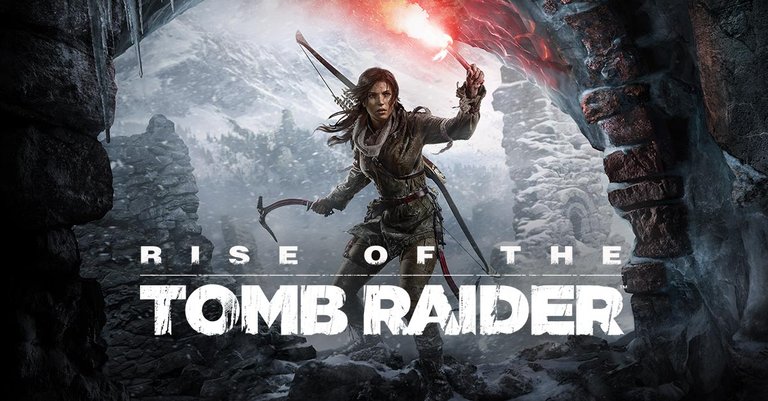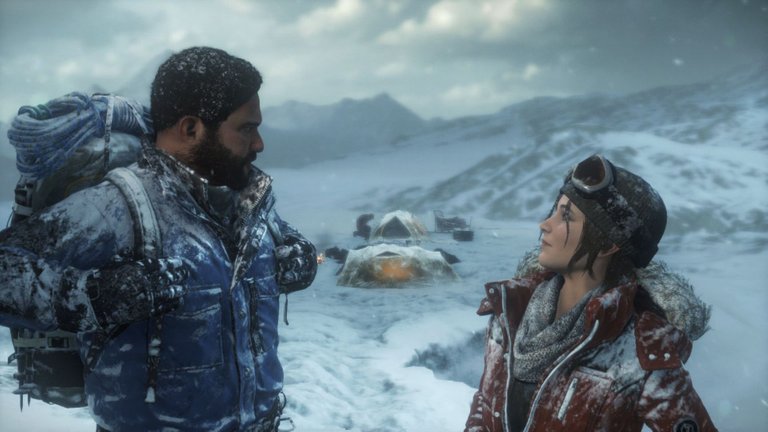
Trauma is a poison, a creeping sludge with acidy burns that seeps into deep, old wounds to make them twitch and sting and paint the world in a lens of anguish. It makes us feel like part of us has died, leaving an exhausted shade in our body’s stead that has given up on recovery, and only seeks purpose. And once the trauma's over, the real challenge begins.
The new trilogy in the Tomb Raider series, referred to in the fandom as the "Survivor Timeline", begins with the story of a woman, Lara Croft, who survives intense violence, the deaths of close friends, near-rape, and a paradigm-shredding encounter with the supernatural. The sequel, Rise of the Tomb Raider, follows the journey for the middle chapter of Lara with plenty of adventure and puzzles and gunplay and archery, but also takes the time, for those invested in the lore and storyline, to delve into the aftermath of Yamatai, or the events of Tomb Raider (2013).
It's Dangerous to Go Alone
Survivor guilt is the most common diagnosis ascribed to Lara Croft, particularly in Rise of the Tomb Raider, in that her anxiety, insomnia, hallucinations, and predilection to violence are all caused by the numerous deaths she witnessed on the island despite her best efforts to save as many lives as she could. While several arcs are covered in the interim between Tomb Raider (2013) and Rise of the Tomb Raider by Dark Horse comics, it's summed up quickly with in-game lore entries that describe Lara Croft seeking aid from a therapist after surviving the constant trauma and violence of the island. It's notable that the series takes a moment to give this attention, as many games and films feature action heroes who battle through similar obstacles and acts of violence, but rarely does the story take a breath to acknowledge the mental and emotional cost of survival as well as the physical, and that recovery requires more than medical care but also psychological assistance.
While Lara's repeated insistence that she forge on alone and leave her companion Jonah (the only fellow survivor of Yamatai that's still in contact with her) behind makes sense from a gameplay standpoint, it also ties into a common mindset for survivors of trauma. Lara, like many survivors, finds shoddy logic to place the blame for the traumatic events of her history upon herself. It can be ascribed to self-loathing, but coupled with her intensified desire for independence, it also speaks to her need for control, the knowledge that everything that happens to her is a result of her own decisions and actions. For Lara, taking responsibility gives both herself and her friends someone to blame, someone present that can shoulder the loathing that, in Lara's eyes, is deserved.
"I'm fine on my own." "I have to do this alone." "You wouldn't understand, that's why I have to do it." These are statements commonly voiced by Lara, but also by survivors. Survivors feel that danger is around every corner (likely because of the hyper-vigilance that so often accompanies PTS), and that no one else is equipped to face what's ahead but them. As a result, they often refuse help when it's offered, and let relationships lapse and decay, usually with a statement that "they're better off without me," (A statement repeated by Lara) until only the most committed are still in contact (usually because of romantic interest), in this case Jonah.

In this case, Jonah is willing to follow Lara to Siberia to search for a mythical lost city. While this is an atypical example, it still bears similarities to the lengths someone with PTS is willing to go to prove that they can continue on alone. Lara's mantra of "Just keep moving forward" is effective in the first game, where she needs to push through her fear to survive, but as stated above, in Rise of the Tomb Raider, forward movement both physically and mentally is used both to give her purpose, and because if one keeps moving, they never have to look at where they currently are, and most importantly, what's behind them. Despite the trauma, Lara, like many survivors, gives only the barest of details regarding it, even when pressed, describing Yamatai as "something I went through", seeing direct evidence of the immortal soul as "I saw something..." The only trauma she gives any detail on is the fate of her father, who apparently committed suicide, when young Lara being the first to find him, a trauma that was largely healed over, but reopened by the events of Yamatai, and exacerbated by the expedition to Siberia.
Have a Little Faith
Lara Croft is best described as a scientific atheist, someone who believes that everything can be explained by the sciences both hard and soft. It's evident in the original Tomb Raider (2013) where when describing Himiko's history as a queen who allegedly had magical power over the weather, Lara's first response is "whenever a woman attains that kind of power, it is inevitably called witchcraft." Until finally confronting Himiko at the final battle of Tomb Raider (2013) and seeing an immortal soul with her own eyes, her atheism was only beginning to falter, but from then on, taking on her father's obsession to research immortality shook away any vestiges of non-belief.
Rise of the Tomb Raider primarily centers around Christianity and two opposing organizations: Trinity, the shadow organization invested in keeping the power of the Church in as few hands as possible, and the Remnants, followers of a Unitarian-esque religion more focused on helping humanity at large, community cooperation, and peaceful living, but still willing to rise up when threatened. Trinity is represented by Konstantin, a zealous and violent operative who believes himself chosen by God to serve Trinity due to stigmata on his hands, who expects complete and utter devotion to his faith from his men. The Remnants are led by Jacob, later revealed to be the Prophet, an immortal man who sought to return the purpose of religion to aiding humanity instead of accumulating wealth and power.
The McGuffin of the journey is the Divine Source, which supposedly can grant immortality, which Lara is obsessed with finding for largely vague reasons that swing from general benevolence to mankind, to redeeming the disgraced name of her family. The motive gets murkier as the journey continues, underlining that Lara is more blindly following a set purpose than any philosophy or goal. Her interactions with Jacob always have the feel of a skeptic grudgingly attending confession, primarily because Jacob's line of questioning always goes to her motivations and reasoning for her obsession. As a survivor, speaking on her past and the painful reasons for her tunnel vision only stokes her to become defensive, or offer vague placating statements of her actions being for the greater good without any thought to the consequences or aftermath.
Faith is a tricky subject for survivors, who either surrender to it completely, or attempt to live defiantly of it, with few in between, but rarely is someone confronted, as Lara was, with direct evidence to contradict her atheism. Lara doesn't end Rise of the Tomb Raider a faithful woman, or even a more spiritual woman, but her journey serves as a check for her to keep from sliding too far, becoming too distant, and considering the morality of her actions. When given the choice to retrieve the Divine Source, she elects to destroy it, having faith in her decision that humanity isn't ready for what the Source would offer. Essentially, Lara rediscovers her faith, but not in any higher power, but rather her faith in herself.
At least until Shadow of the Tomb Raider comes out.

Posted from my blog with SteemPress : https://vaughndemont.com/2018/06/12/a-survivors-recovery-in-rise-of-the-tomb-raider/